
Key Takeaways
- Six out of 10 homeowners felt the ideal stove had four burners, and they preferred gas (57%) as the perfect cooktop style over electric (31.6%).
- Efficiency and functionality (44.3%) were ranked of highest importance in a perfect kitchen.
- Forty-seven percent of respondents said they had a pan or kitchen tool that no one else was allowed to use.
- Almost three out of four women said they did not care if houseguests brought a gift, compared to only half of men.
- Gen Zers were the most likely generation to expect their hosts to make special dietary accommodations for them.
Many people are particular about the way they work in their own kitchen—how they cook, how they clean, and even what utensils they use. When we enter someone else’s kitchen, it can be very easy to accidentally step on toes. Perhaps you used that special gadget meant for their hands only. Maybe you’re cooking something on heat that’s way too high. What if your in-laws have a totally different way they cook that chicken? No matter what, if you’re sharing a kitchen or a meal with guests, there are likely to be some pet peeves.
As holiday season approaches, we surveyed over 1,000 Americans on their biggest kitchen pet peeves and delved into dinner expectations—both for the guests and hosts.
Kitchen of Your Dreams
Picture your perfect kitchen; what features does it have? We asked respondents what’s most important to them.
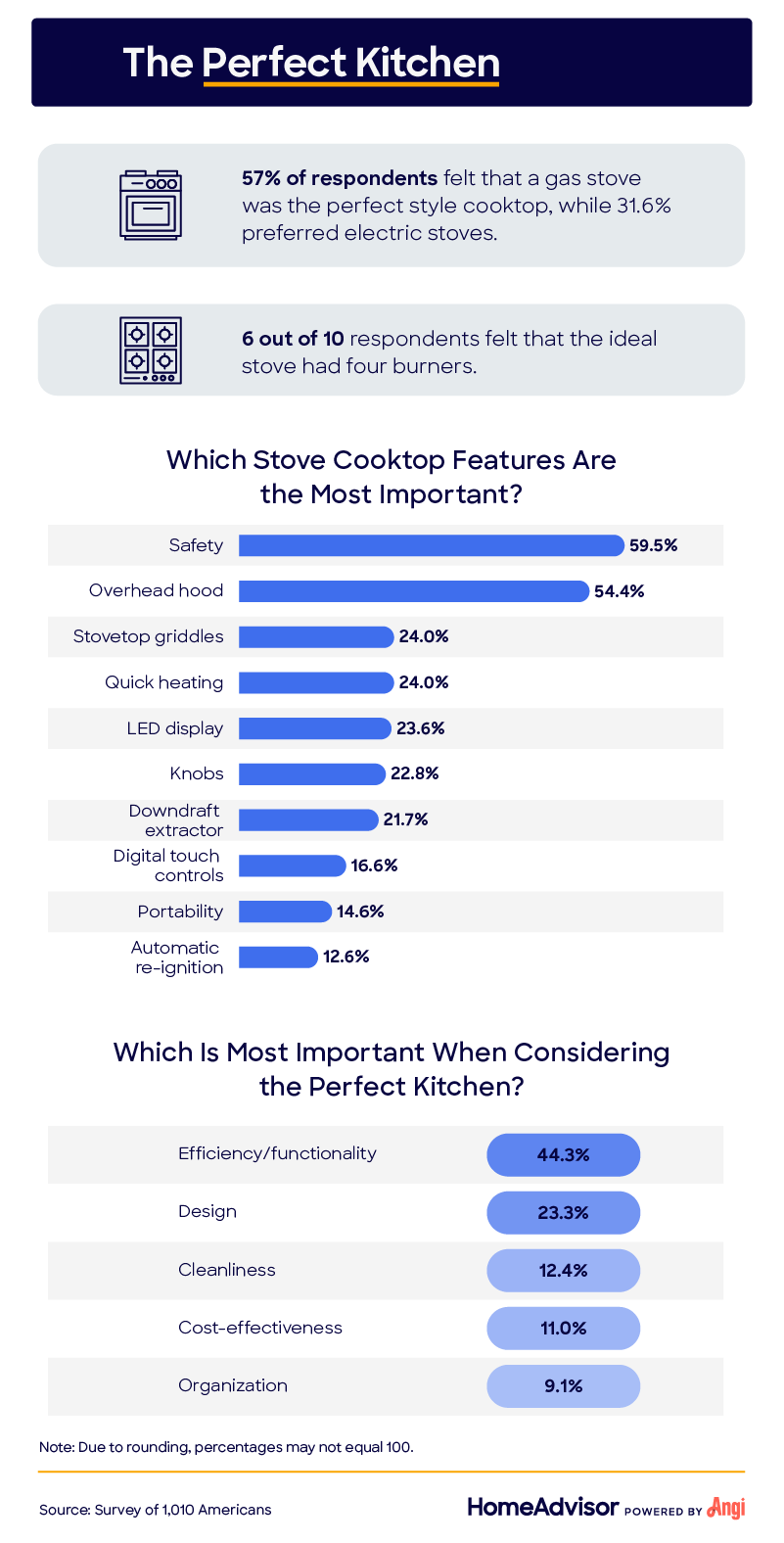
Six out of 10 homeowners felt the ideal stove had four burners, and more preferred gas (57%) over electric (31.6%). However, the costs of replacing an existing gas stovetop are slightly higher than electric.
Efficiency and functionality (44.3%) ranked highest in importance over design (23.3%), cleanliness (12.4%), cost-effectiveness (11%), and organization (9.1%) in a perfect kitchen. With this in mind, the most important stovetop feature was safety (59.5%). Close behind, 54.4% of those surveyed also believed an overhead hood was important.
Kitchen Faux Pas
Certain kitchen habits may get under one’s skin, while others are left unfazed.
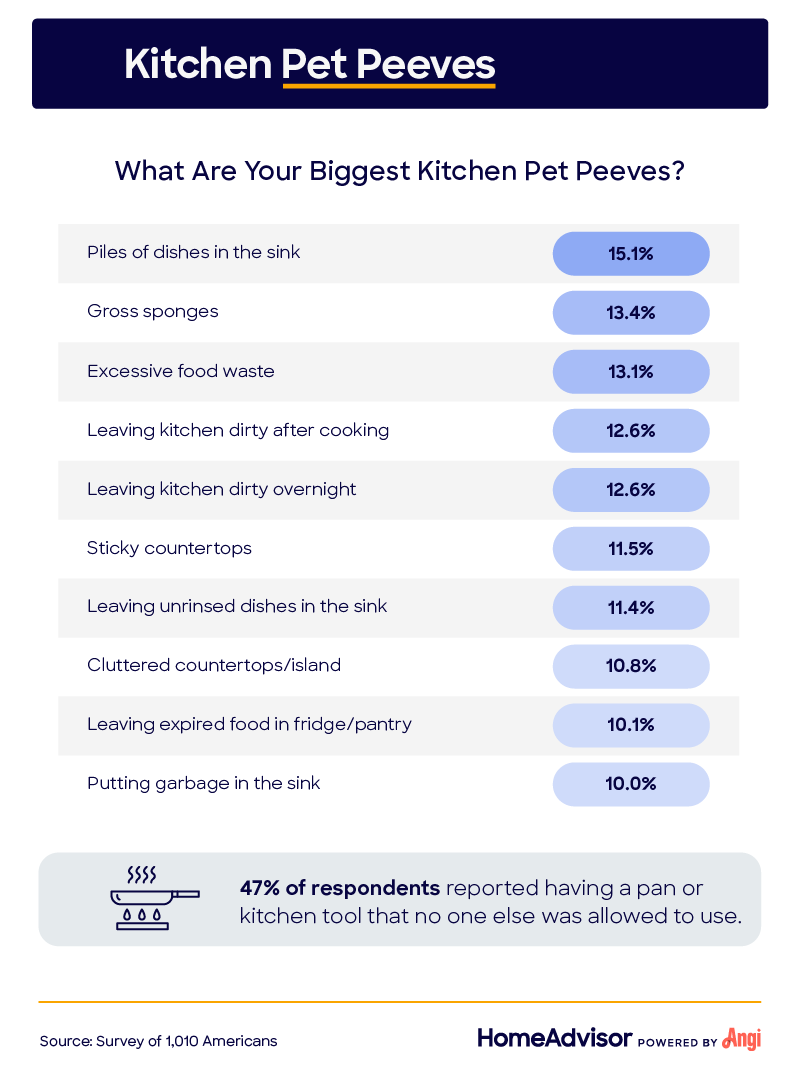
Kitchen pet peeves varied based on generation, just as cleanliness standards fluctuated by individual.
- More than one in 10 Gen Zers said having a roommate use their ingredients or eat their leftovers is a pet peeve.
- Millennials were the generation most likely to call foul on not cleaning out expired food from the fridge.
- One in six Gen Xers felt that leaving dishes in the sink without rinsing them, or putting garbage in the sink, were big pet peeves.
- More than one in 10 baby boomers reported licking kitchen utensils while cooking as a kitchen pet peeve.
Several of these common pet peeves revolved around dishes, whether it was leaving piles in the sink or not rinsing them. A mess left overnight may ruffle feathers as well. If your kitchen is equipped with a dishwasher, this may provide a solution; still, 61.9% of respondents said they would be willing to rent or buy a home without a dishwasher.
Hostess With the Mostest
When picturing at-home get-togethers with friends and family, respondents preferred hosting over being hosted—especially men.
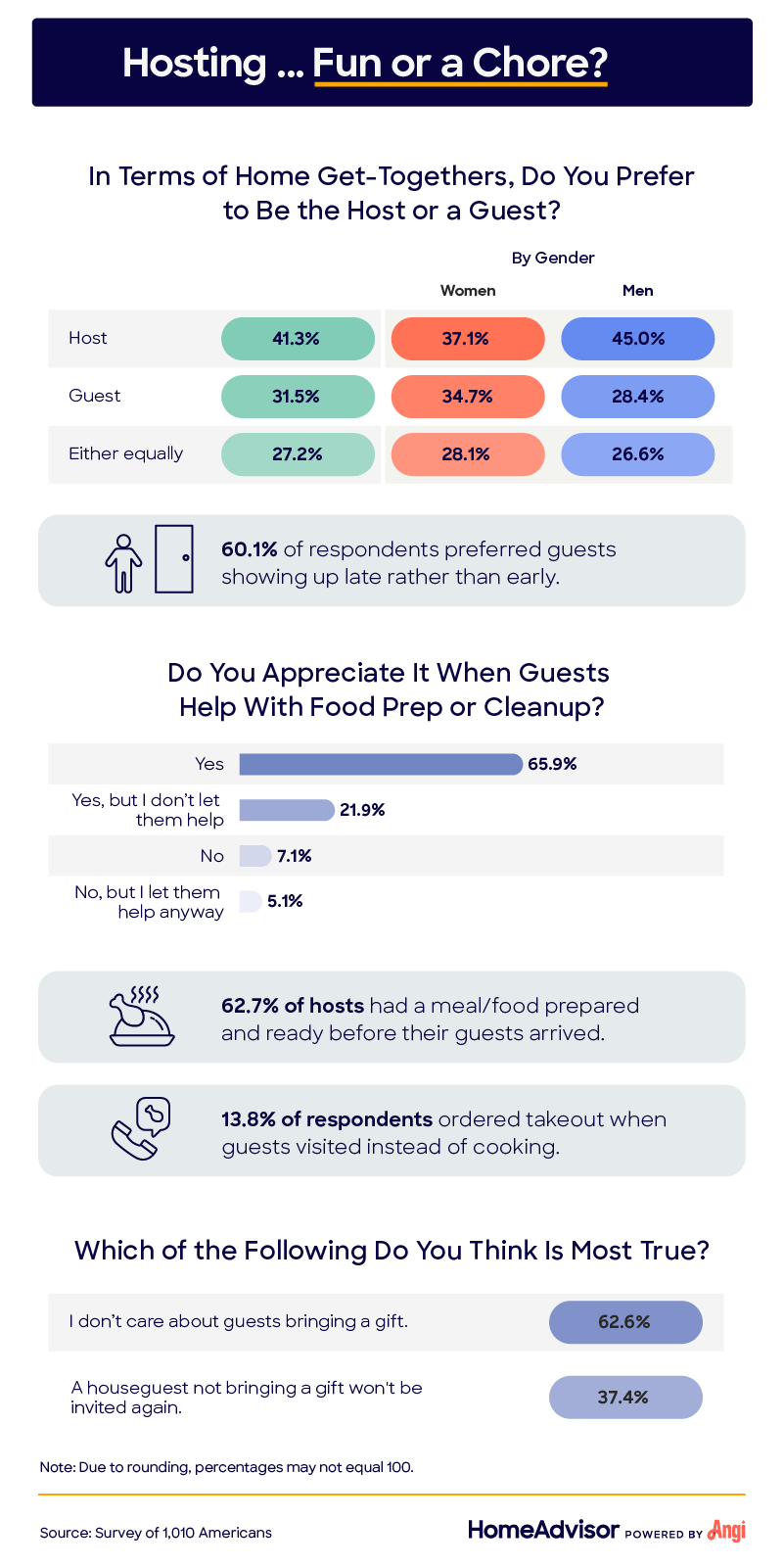
The majority (62.7%) of hosts had food prepared and ready before their guests arrived. So because they’re in a hurry to clean and cook, hosts preferred a fashionably late guest over an early bird (60.1%). Male Gen Zers that opted out of cooking were the most likely to order takeout. Once the meal comes to an end, most hosts appreciated clean-up assistance (65.9%) or at least an offer to help (21.9%).
Some guests may offer to bring a dish while others bring a gift, such as a bottle of wine or bouquet of flowers, to show their gratitude. A kind gesture, although not necessary since over half (62.6%) of hosts reported not caring if a gift was brought. Almost three out of four women said they did not care if guests brought a gift, compared to only half of men saying the same.
Conversely, 37.4% of hosts did not take kindly to this perceived lack of etiquette and were salty enough to not invite a guest back if they arrived with empty hands. As generations aged, they cared less about guests bringing gifts. Gen Zers were the most likely to be bothered by this and not invite someone back, while baby boomers cared the least.
Bringing the Party
As the holidays approach, expect gatherings with family and friends.
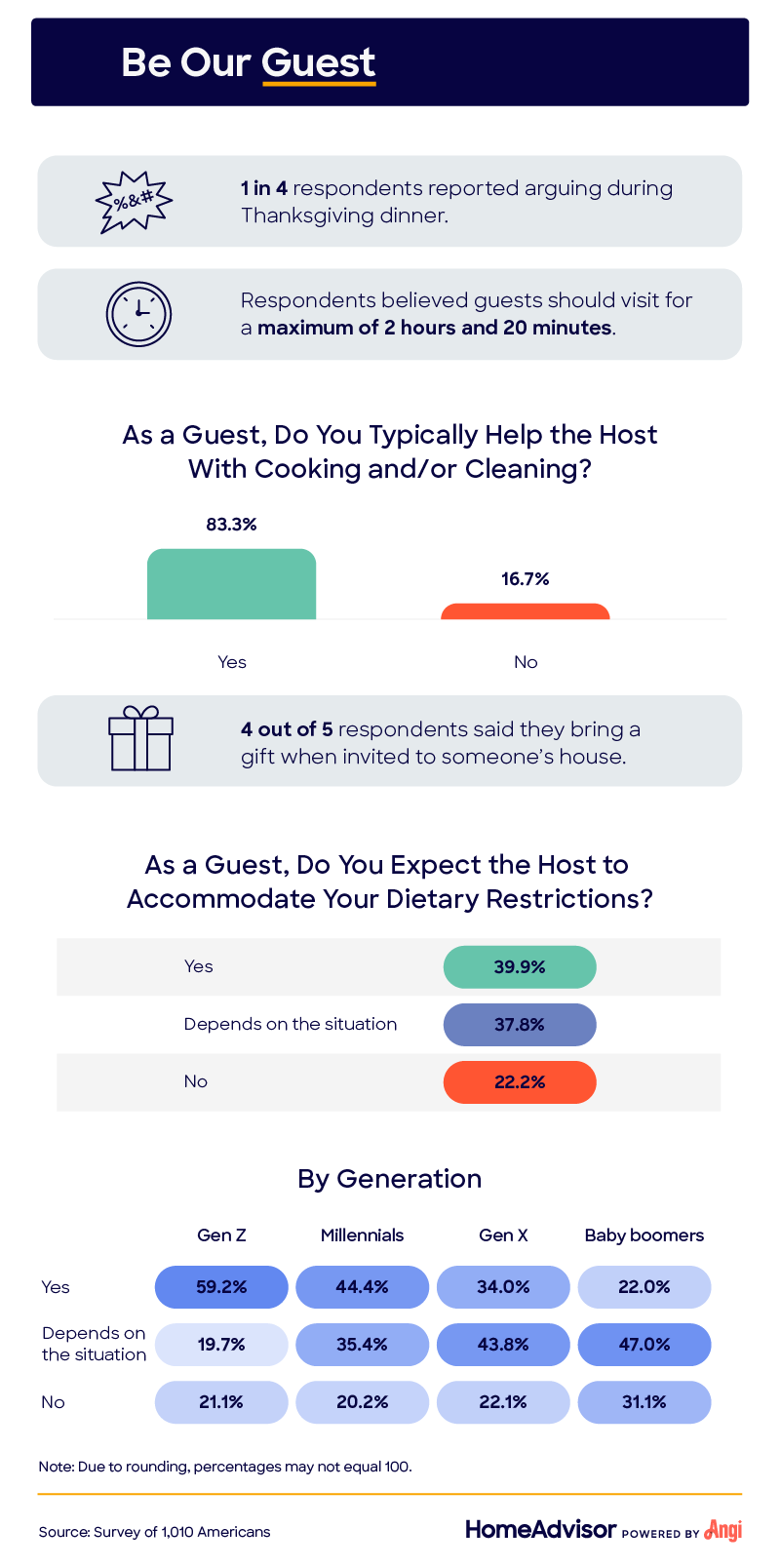
As a guest, 39.9% expected their hosts to accommodate their diet restrictions, while 37.8% believed it was dependent on the situation. Meanwhile, almost three out of four respondents said that, as a host, they check in with their guests about dietary restrictions prior. Gen Zers were the most likely to expect special dietary accommodations. Catering to serious food allergies, such as celiac disease, would likely outweigh a picky eater or guest on the latest fad diet.
Generally, guests come with empty bellies and on their best behavior. Over 80% assisted their host with cooking or cleaning, and 80% reported bringing a gift when invited into another’s home. Gen Xers (84.3%) were the most likely to bring a gift, while millennials (78.3%) were the least likely.
However, when families get together for holidays, things aren’t always peachy. One out of four respondents reported fighting over Thanksgiving dinner.
Courtesy in a Sacred Space
As one of the most important rooms in a home, the ideal kitchen is efficient and functional with a safe (and preferably four-burner) gas stove. Cleanliness was secondary, although a variety of kitchen habits may be perceived as pet peeves. Whether it’s a cluttered countertop or a sink piled to the brim with dirty dishes, the kitchen is an area in the home where it could be easy to accidentally get under someone’s skin.
Four out of five guests brought gifts when invited to someone else’s home, although the majority of hosts did not care if one was brought. In return, guests generally expected hosts to accommodate their dietary restrictions or at least do so on a situational basis. After eating a home-cooked meal or takeout, 83.3% of guests offered assistance with clean-up, and most hosts appreciated the courtesy and allowed the help.
Methodology and Limitations
This study uses data from a survey of 1,010 people located in the U.S. Respondents were gathered through an online survey platform where they were presented with a series of questions, including attention-check and disqualification questions. Nearly 52% of respondents identified as men, while 47.9% identified as women, and 0.3% identified as nonbinary or chose not to disclose their gender. Respondents ranged in age from 21 to 74 with an average age of 37. Millennials accounted for 34% of respondents, 25.9% were Gen Xers, 19.5% were baby boomers, and 20.6% were Gen Zers. Participants incorrectly answering any attention-check question had their answers disqualified. This study has a 3% margin of error on a 95% confidence interval.
Please note that survey responses are self-reported and are subject to issues such as exaggeration, recency bias, and telescoping.
Fair Use Statement
Although a seemingly humorous topic, some kitchen pet peeves may strain relationships. If this article resonated with you, feel free to share it for noncommercial use but please link back to this article when doing so.
 Garbage Disposal Basics
Garbage Disposal Basics  Refrigerator Repair – When to Fix and When to Pitch
Refrigerator Repair – When to Fix and When to Pitch 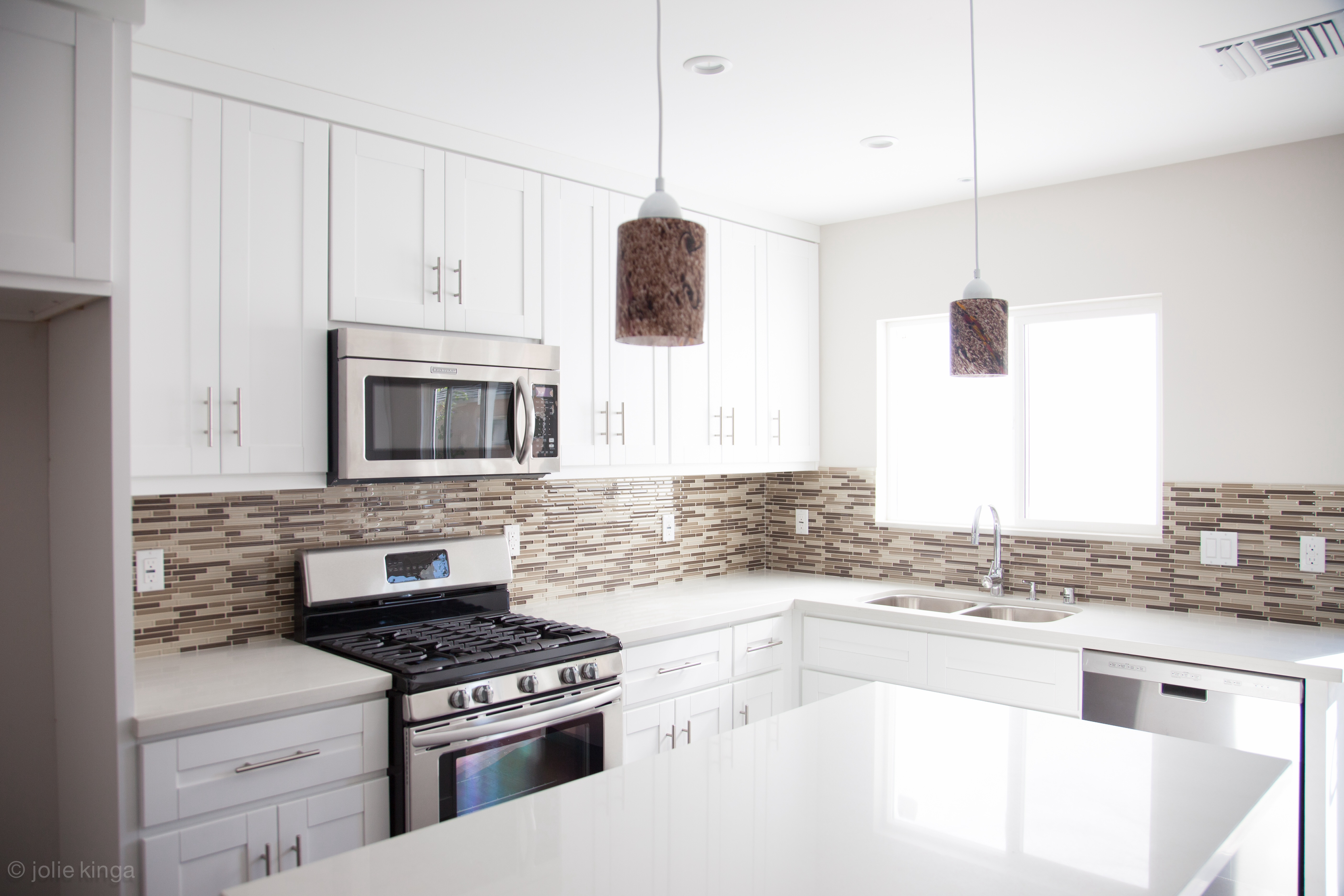 Minor Kitchen Remodels – Consider Spending Less Than Average
Minor Kitchen Remodels – Consider Spending Less Than Average 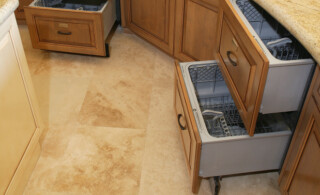 Compact and Counter Top Dishwashers: Save Space with Style
Compact and Counter Top Dishwashers: Save Space with Style 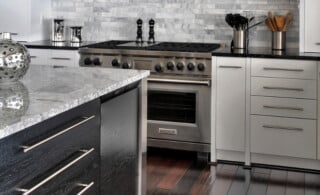 Steam Assist Ovens
Steam Assist Ovens 

Are You Familiar With This Topic? Share Your Experience.